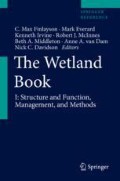Abstract
Water resources in many of the world's river basins are highly modified and over-allocated. The resulting decline in ecosystem services impacts on human well-being. Since the 1990s, the legitimacy of environmental requirements alongside economic and social needs for water has been a part of Integrated Water Resources Management (IWRM). The environmental flows concept supports determining the required flow regimes but technical complexity, lack of ecohydrological data, institutional challenges and poor understanding of ecosystem services have restricted the implementation of environmental flows as a core component of IWRM. Integrating environmental flows into IWRM requires a participatory process with major stakeholders developing a shared vision on the interdependencies of water, food, and energy, resulting in flows for multiple benefits. Research should focus on simplified recommendations for integrated basin flow assessment, on operational rules that optimise multiple outcomes, and on uncertainties such as climate change and economic growth.
References
Acreman MC, Overton IC, King J, Wood P, Cowx IG, Dunbar MJ, Kendy E, Young W. The changing role of eco-hydrological science in guiding environmental flows. Hydrol Sci J. 2014;59(3–4):433–50.
Arthington AH. Environmental flows: saving rivers in the third millennium. Berkeley: University of California Press; 2012.
Costanza R, Giovannini E, Lovins H, McGlade J, Pickett K, Ragnarsdóttir K. Time to leave GDP behind. Nature. 2014;505:283–8.
Dudgeon D. Prospects for sustaining freshwater biodiversity in the 21st century: linking ecosystem structure and function. Curr Opin Environ Sustain. 2010;2:422–30.
Dyson M, Bergkamp G, Scanlon J, editors. Flow: the essentials of environmental flows. Gland: IUCN; 2003.
Galaz V. Water governance, resilience and global environmental change – a reassessment of integrated water resources management (IWRM). Water Sci Technol. 2007;56:1–9.
Hirji R, Davis R. Environmental flows in water resources policies, plans and projects: findings and recommendations. Washington, DC: The World Bank; 2009.
Iyer RR. The notion of environmental flows: a caution. NIE/IWMI workshop on environmental flows, New Delhi, 23–24 Mar 2005.
Jain S, Kumar P. Environmental flows in India: towards sustainable water management. Hydrol Sci J. 2014;59(3–4):751–69.
Le Quesne T, Kendy E, Weston D. The implementation challenge: taking stock of government policies to protect and restore environmental flows. WWF-UK and The Nature Conservancy; 2010.
Maltby E, Holdgate M, Acreman MC, Weir A, editors. Ecosystem management: questions for science and society. Sibthorp Trust; 1999.
MEA. Ecosystems and human well-being: biodiversity synthesis. Millennium Ecosystem Assessment. Washington, DC: World Resources Institute; 2005.
Meijer KS. Human well-being values of environmental flows: enhancing social equity in integrated water resources management, Delft hydraulics select series, vol. 10. Amsterdam: IOS Press; 2007.
Moore M, Forslund A. Environmental flows and human well-being. Barcelona: Water Pavilion, IUCN Congress; 2008.
Overton IC, Smith DM, Dalton J, Barchiesi S, Acreman MC, Stromberg JC, Kirby JM. Implementing environmental flows in integrated water resources management and the ecosystem approach. Hydrol Sci J. 2014;59(3–4):860–77.
Richter BD. Re-thinking environmental flows: from allocations and reserves to sustainability boundaries. River Res Appl. 2009;26:1052–63.
Richter BD, Baumgartner JV, Powell J, Braun DP. A method for assessing hydrological alteration within ecosystems. Conserv Biol. 1996;10:1163–74.
Sarewitz D. How science makes environmental controversies worse. Environ Sci Policy. 2004;7:385–403.
Weir JK. Cultural flows in Murray River country. Aust Humanit Rev. 2010;48:131–42 . ANU E Press, Canberra.
Author information
Authors and Affiliations
Corresponding author
Editor information
Editors and Affiliations
Rights and permissions
Copyright information
© 2018 Springer Science+Business Media B.V., part of Springer Nature
About this entry
Cite this entry
Overton, I. (2018). Environmental Flows and Integrated Water Resources Management. In: Finlayson, C.M., et al. The Wetland Book. Springer, Dordrecht. https://doi.org/10.1007/978-90-481-9659-3_351
Download citation
DOI: https://doi.org/10.1007/978-90-481-9659-3_351
Published:
Publisher Name: Springer, Dordrecht
Print ISBN: 978-90-481-3493-9
Online ISBN: 978-90-481-9659-3
eBook Packages: Biomedical and Life SciencesReference Module Biomedical and Life Sciences

